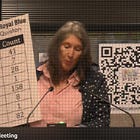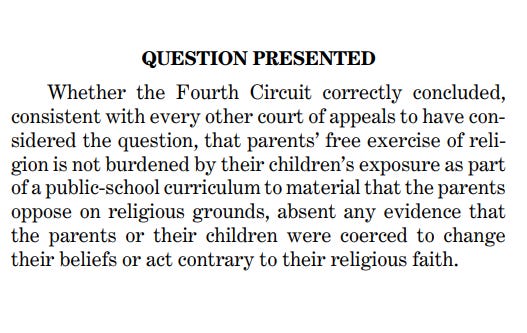Librarian sends 'Experts Know Best' email to lawmaker
But parents are the experts on their children
Wake County Republican Rep. Erin Paré was contacted by a Wake County Public Schools librarian over her support of House Bill 636, which is titled, "Promoting Wholesome Content for Students."
Here's the most recent summary of that bill, which lays out book selection and challenge processes for K-12 schools. It also lets parents sue if they think their district is violating the law, should it be passed. I mention House Bill 636 in the second half of my North State Journal report on a similar, but arguably stronger bill (House Bill 595).
In a nutshell, this librarian, who Paré says is also a “politically-charged” NC Association of Educators member, asserts that because they hold a master’s in library science, that makes them an expert and therefore more qualified than parents to decide what books are best for their K-12 children.
Here’s part of the thread posted to X:
Being an expert on library systems does not make you an expert on what’s best for someone else’s child. Parents are the experts on their own children.
This is the same type of “experting” mentality parents went up against when opposing Common Core a decade ago.
Related:
More To The Story
SCOTUS has already well-established children belong to their parents and not the state. Maybe a case the high court is now hearing will make that clear to the aforementioned librarian.
Oral arguments in Mahmoud v. Taylor were heard by SCOTUS this week. In this case, Maryland parents want to be able to opt their kids out of books and materials that violate their religious conscience; specifically mentioned are materials and books with gender ideology, sexuality and, LGBT-themes.
The Fourth Circuit sided with Thomas Taylor, superintendent of the Montgomery County Public School System. The parents appealed to the Supreme Court. While the question presented is limited to religious faith, there is a broader questioned at play here - the rights of parents to choose what their children are exposed to.
Part of the oral arguments were a bit stunning, with the attorney representing the school explaining that sexually charged books are not in school libraries on accident, but rather admitted these books were intended to "influence" children. Listen to the exchange with Justice Gorsuch here.
SCOTUS Blog feels the court is poised to rule for the parents.
"The Supreme Court on Tuesday was sympathetic to a group of Maryland parents who want to be able to opt their elementary-school-aged children out of instruction that includes LGBTQ+ themes. The parents argued that the local school board’s refusal to give them that choice violates their religious beliefs and therefore their constitutional right to freely exercise their religion. During nearly two-and-a-half hours of oral argument, a majority of the justices seemed to agree with them, with several justices questioning whether there would even be any harm to simply allowing the parents to excuse their children from the instruction."
A very long list of briefs in support of the parents have been filed, including Charlotte-based NC Values Coalition, which filed an amicus brief in support of the parents in this case last fall.
A recent article went out to MTTS paid subscribers was on challenged books in schools. The article covered one of President Donald Trump's executive orders that cut funding to the Institute of Museum and Library Services, which in turn funds the American Library Association (ALA).
The ALA has been cited by school boards and book panels as the rationale for keeping challenged sexual graphic materials in K-12 schools.
Excerpt from the paid subscriber post:
The ALA is the party responsible for indecent and pornographic books not only being allowed, but protected in K-12 schools.
The slew of internet age verification bills introduced in nearly every state isn't a coincidence either, the ALA, along with the ACLU, fought the Children's Internet Protection Act (CIPA) enacted in 2000 by Congress. In brief, CIPA required public libraries to use internet filtering software that blocked indecent/pornographic sites in order to get federal internet access funding. A lower court ruled CIPA "facially" unconstitutional but the Supreme Court overruled that court in a 2003 decision.
The ALA has led the purposefully mislabeled "book ban" charge for a number of years and championed the graphic novel Gender Queer, a book with detailed images of homosexual encounters and text to match, as appropriate for K-12 kids; even for elementary school children which can be as young as 5.
The ALA even gave Gender Queer at a "book of the year award," which school boards have used like a shield in order to keep it on public schools shelves when parents have challenged it.
Upgrade to paid for $5/month and unlock the whole article:








